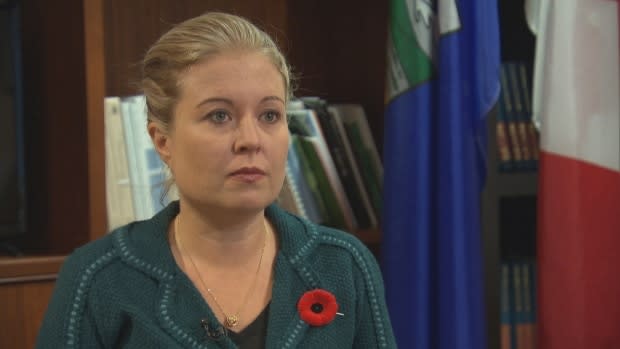Conservatives to try to force Trudeau's hand on western alienation
The Conservatives warned on Sunday that they will use every measure available to force the Trudeau government to bend to their demands over western alienation.
Calgary Nose Hill MP Michelle Rempel Garner said the interests of western provinces, such as Alberta and Saskatchewan, will be priority number one in the next session of Parliament — but she didn't shed further light on what tools her party would rely on to achieve their goal other than to say "stay tuned."
"Justin Trudeau has not come close to seeing the force of three million mobilized Albertans actively opposing his policies and actively showing the country the consequences of a unity crisis," Rempel Garner said. "So my message to him is giddy up."
The message came a day after Alberta Premier Jason Kenney announced his United Conservative government was seeking more autonomy for the province, a direction similar to what Quebec has taken in the past.
Under the plan, Alberta will open offices in other provinces, introduce an act to give Albertans the power to petition referendums and create an advisory panel that will travel the province to consult on decisions, such as whether the province should establish its own revenue agency and police force.

Rempel Garner called Kenney's move appropriate, and said Conservative Alberta MPs are planning a complementary response to further the province's independence and ensure it's reflected in Trudeau's next mandate.
"He's going to have to deal with this as a first order of business," Rempel Garner said.
"We have many experienced members of parliament that will be using every lever possible to make the rest of the country and Justin Trudeau understand how serious we are about this."
In response to Kenney's announcement, the Prime Minister's Office issued a statement by spokesperson Chantal Gagnon, which said Trudeau "hopes to meet with all premiers one on one at the earliest opportunity to work on shared goals and make life better for all Canadians."
Trudeau meeting Scheer, Sask. premier on Tuesday
Prime Minister Justin Trudeau has tapped former federal cabinet Minister Anne McLellan to advise the government on the transition process.
As part of that role, McLellan — who served as an Edmonton MP under the Liberal governments of Jean Chrétien and Paul Martin — is providing the government with a voice on western issues after the Liberals were completely shut out of Alberta and Saskatchewan during the Oct. 21 federal election.
Addressing western concerns is the first order of business for the Conservatives, according to Rempel Garner, and it will be top of mind when Conservative Party Leader Andrew Scheer meets Trudeau on Tuesday.
Trudeau will be meeting Scheer, along with the leaders of the other main political parties and premiers this week.
Saskatchewan Premier Scott Moe announced today that his one-on-one with Trudeau is scheduled for Tuesday in Ottawa.
"Following the election of Prime Minister Trudeau's minority government, I raised three Saskatchewan priorities that I will be emphasizing with the Prime Minister: adjusting the inequitable equalization formula, putting a one-year pause on the carbon tax so federal and provincial officials can re-evaluate Saskatchewan's plan to address climate change, and expanding market access for Saskatchewan exports," Moe said in a written statement.
"In each case, we are proposing reasonable actions the Prime Minister and his minority government can take that will show he is prepared to address the concerns and frustrations of Saskatchewan people."
Manitoba Premier Brian Pallister met with Trudeau last Friday, in which he offered friendly advice to the prime minister on how to address western anger.

"Fighting climate change is a unifying project. A political leader can divide, a prime minister should unite," Pallister said. "So as we move forward we should unite around fighting climate change and we should not be caught up in a subset of a subset. Carbon tax is not the only way [to deal with climate change].
"I think there are many messages that could be taken from the federal election, but definitely one of them is that this is a country that is divided on a number of key issues right now. So unification efforts and a willingness to change one's approaches are important things."
'Status quo is not going to cut it'
Rempel Garner calls the situation a "unity crisis," and has a clear set of demands for the Liberals.
"Be proud of the energy sector," said Rempel Garner.
"Scrap Bill C-69, scrap Bill C-48, stop politically vetoing pipelines and start understanding that the response to climate change is not solely making Alberta bear the response of policies that really do nothing to reduce greenhouse gas emissions and stoke division across the country."
The passage of the two bills — C-48 concerns the legislation that bans oil tankers in northern B.C., while C-69 is legislation that overhauls Canada's environmental assessment process — are key points of contention for Rempel Garner and her Tory colleagues who view the bills as anti-pipeline.
Rempel Garner also said there is a lack of understanding and an almost mocking tone across the country about how bad Alberta's economy is doing.
"The outcome, from my perspective and those in Alberta is very clear: the status quo is not going to cut it," Rempel Garner said.
"I don't think that Trudeau has seen or understands what our province is capable of."


